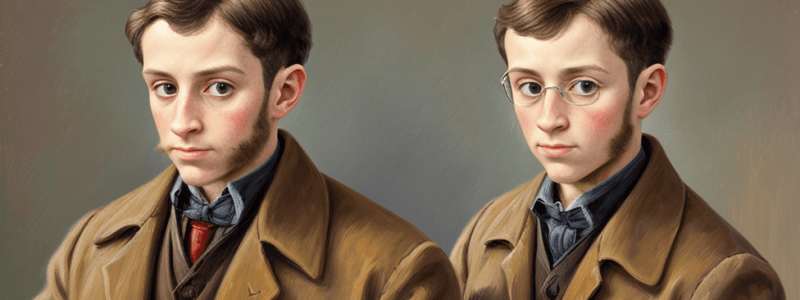Podcast
Questions and Answers
Who is associated with classical conditioning?
Who is associated with classical conditioning?
- Skinner
- Bobo the Clown
- Erikson
- Pavlov (correct)
Which type of conditioning involves pairing a neutral stimulus with an unconditioned stimulus to elicit a natural response?
Which type of conditioning involves pairing a neutral stimulus with an unconditioned stimulus to elicit a natural response?
- Classical conditioning (correct)
- Operant conditioning
- Reinforcement conditioning
- Social conditioning
In which stage of Erik Erikson's psychosocial development does the conflict of Trust vs. Mistrust occur?
In which stage of Erik Erikson's psychosocial development does the conflict of Trust vs. Mistrust occur?
- Birth to 1.5 years (correct)
- Early Adulthood
- Adolescence
- Middle Adulthood
Who posited that behaviors are developed or conditioned through reinforcements?
Who posited that behaviors are developed or conditioned through reinforcements?
What is the conflict in the stage of Industry vs. Inferiority in Erik Erikson's psychosocial development?
What is the conflict in the stage of Industry vs. Inferiority in Erik Erikson's psychosocial development?
Who is associated with operant conditioning?
Who is associated with operant conditioning?
'Intimacy vs. Isolation' is a conflict in which stage of Erik Erikson's psychosocial development?
'Intimacy vs. Isolation' is a conflict in which stage of Erik Erikson's psychosocial development?
'Identity vs. Role Confusion' is a conflict in which stage of Erik Erikson's psychosocial development?
'Identity vs. Role Confusion' is a conflict in which stage of Erik Erikson's psychosocial development?
'Generativity vs. Stagnation' is a conflict in which stage of Erik Erikson's psychosocial development?
'Generativity vs. Stagnation' is a conflict in which stage of Erik Erikson's psychosocial development?
What is the primary focus of operant conditioning?
What is the primary focus of operant conditioning?
In Erikson's theory of development, individuals advance through stages based on how they adapt to:
In Erikson's theory of development, individuals advance through stages based on how they adapt to:
According to Bandura's Social Cognitive Theory, individuals learn by observing others and the consequences of their actions, and then imitating those behaviors. This theory also highlights the role of cognitive processes, such as:
According to Bandura's Social Cognitive Theory, individuals learn by observing others and the consequences of their actions, and then imitating those behaviors. This theory also highlights the role of cognitive processes, such as:
Which stage of Kohlberg's Moral Development Theory is characterized by a focus on maintaining good relations and conforming to societal norms?
Which stage of Kohlberg's Moral Development Theory is characterized by a focus on maintaining good relations and conforming to societal norms?
According to Freud's Psychosexual Theory, which stage is associated with a focus on the genital region and the emergence of sexual interests?
According to Freud's Psychosexual Theory, which stage is associated with a focus on the genital region and the emergence of sexual interests?
What does the term 'senescence' refer to?
What does the term 'senescence' refer to?
What is the central concept in Piaget's cognitive development theory that refers to the mental representation of the real world?
What is the central concept in Piaget's cognitive development theory that refers to the mental representation of the real world?
According to Bandura's Social Cognitive Theory, what term refers to an individual's belief in their capability to execute courses of action required to achieve given types of performances?
According to Bandura's Social Cognitive Theory, what term refers to an individual's belief in their capability to execute courses of action required to achieve given types of performances?
What does Freud's Psychosexual Theory suggest about a person's body and behavior?
What does Freud's Psychosexual Theory suggest about a person's body and behavior?
'Memory consolidation' refers to the process that:
'Memory consolidation' refers to the process that:
'Midlife Crisis' is best described as:
'Midlife Crisis' is best described as:
Flashcards
Classical Conditioning
Classical Conditioning
Learning through associating a neutral stimulus with an unconditioned stimulus to elicit a response.
Operant Conditioning
Operant Conditioning
Learning through consequences (rewards and punishments) to modify behavior.
Trust vs. Mistrust
Trust vs. Mistrust
Erikson's first stage where infants develop a sense of trust or mistrust based on caregiver reliability.
Industry vs. Inferiority
Industry vs. Inferiority
Signup and view all the flashcards
Identity vs. Role Confusion
Identity vs. Role Confusion
Signup and view all the flashcards
Intimacy vs. Isolation
Intimacy vs. Isolation
Signup and view all the flashcards
Generativity vs. Stagnation
Generativity vs. Stagnation
Signup and view all the flashcards
Social Cognitive Theory
Social Cognitive Theory
Signup and view all the flashcards
Moral Development (Law and Order)
Moral Development (Law and Order)
Signup and view all the flashcards
Psychosexual Stages
Psychosexual Stages
Signup and view all the flashcards
Schema
Schema
Signup and view all the flashcards
Memory Consolidation
Memory Consolidation
Signup and view all the flashcards
Senescence
Senescence
Signup and view all the flashcards
Midlife Crisis
Midlife Crisis
Signup and view all the flashcards
Cognitive Development Theory
Cognitive Development Theory
Signup and view all the flashcards
Study Notes
Classical Conditioning and Associative Learning
- Ivan Pavlov is associated with classical conditioning
- Classical conditioning involves pairing a neutral stimulus with an unconditioned stimulus to elicit a natural response
- This type of conditioning is used to create a conditioned response to a stimulus that naturally and automatically triggers a response
Erik Erikson's Psychosocial Development
- The conflict of Trust vs. Mistrust occurs in the first stage of Erik Erikson's psychosocial development, which is Infancy (0-1.5 years)
- Industry vs. Inferiority is the conflict in the fourth stage of Erik Erikson's psychosocial development, which is Middle Childhood (6-12 years)
- In this stage, children must learn to accomplish tasks and take pride in their accomplishments in order to develop a sense of competence
- Intimacy vs. Isolation is the conflict in the sixth stage of Erik Erikson's psychosocial development, Young Adulthood (18-40 years)
- Identity vs. Role Confusion is the conflict in the fifth stage of Erik Erikson's psychosocial development, Adolescence (12-18 years)
- Generativity vs. Stagnation is the conflict in the seventh stage of Erik Erikson's psychosocial development, Middle Adulthood (40-65 years)
Operant Conditioning
- B.F. Skinner is associated with operant conditioning
- The primary focus of operant conditioning is on behaviors that are developed or conditioned through reinforcements
- Reinforcement is a key concept in operant conditioning, which refers to any stimulus that increases the likelihood of a behavior occurring
Theories of Development
- Erik Erikson's theory of development states that individuals advance through stages based on how they adapt to the psychosocial crises of each stage
- Albert Bandura's Social Cognitive Theory states that individuals learn by observing others and the consequences of their actions, and then imitating those behaviors
- Cognitive processes such as attention, memory, and motivation play a crucial role in social learning
Moral Development Theory
- Kohlberg's Moral Development Theory has six stages, with the fourth stage characterized by a focus on maintaining good relations and conforming to societal norms
- This stage is known as the Law and Order orientation, where individuals understand the importance of social norms and laws in maintaining social order
Psychosexual Theory
- Freud's Psychosexual Theory suggests that a person's body and behavior are shaped by their experiences and desires, particularly as they progress through the five stages of psychosexual development
- The fifth stage of Freud's Psychosexual Theory, Genital stage, is associated with a focus on the genital region and the emergence of sexual interests
Cognitive Development Theory
- Piaget's cognitive development theory states that the central concept of schema refers to the mental representation of the real world
- A schema is an organized pattern of thought or behavior that helps individuals understand and make sense of their environment
Senescence
- Senescence refers to the process of aging and declining physical and mental abilities that occur naturally as people get older
Memory and Learning
- Memory consolidation refers to the process that stabilizes and strengthens memories, making them easier to retrieve and recall
- Memory consolidation occurs through the process of consolidation, which involves changes in the strength of neural connections between neurons in the brain
Midlife Crisis
- Midlife crisis is a term used to describe a period of emotional and psychological crisis that occurs in middle adulthood, often triggered by a major life event or transition.
Studying That Suits You
Use AI to generate personalized quizzes and flashcards to suit your learning preferences.
Related Documents
Description
Test your understanding of behaviorism, conditioning, and the key figures associated with classical and operant conditioning such as Pavlov and Skinner. Explore the concepts of modeling, social context, and the influential experiments that shaped our understanding of human behavior.




